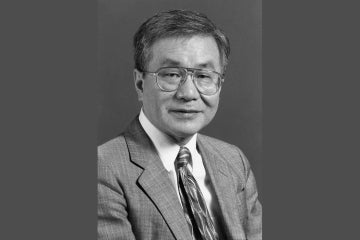U of T students, learners awarded prestigious Rhodes Scholarships
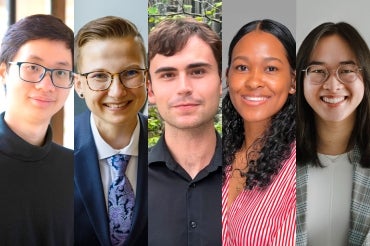
From left to right: 2024 Rhodes Scholars Sapolnach Prompiengchai, Leighton Schreyer, Adam Martínez, Tierrai Tull and Anne Xuan-Lan Nguyen (supplied images, photo of Tull by Tysen Harvey Photography Bermuda)
Published: November 28, 2023
For the first time in more than three quarters of a century, four University of Toronto students have been selected for a prestigious Rhodes Scholarship in a single year.
With interests that span mental health, narrative health, gender and discovering next-gen materials, Sapolnach Prompiengchai, Tierrai Tull, Leighton Schreyer and Adam Martínez are headed to Oxford University with the support of the coveted scholarship, which identifies and supports exceptional young people with the potential to make a positive impact on the world.
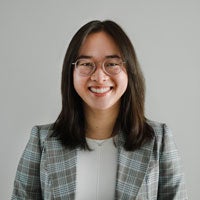
A fifth member of the U of T community, Anne Xuan-Lan Nguyen, an ophthalmology and vision sciences resident in the Temerty Faculty of Medicine, also received a Rhodes Scholarship via her alma mater, McGill University.
“The University of Toronto is delighted to see so many of our exceptional students and learners join the world-renowned community of Rhodes Scholars,” says U of T President Meric Gertler.
“We wish them continued success as they enter the next chapter of their academic journeys. And we look forward to seeing their accomplishments and contributions to society in the years to come.”
Here are the four U of T students – two Canadian students, two international students – who recently joined an elite group of more than 100 new Rhodes Scholars from across the globe as part of the 2024 cohort:
Sapolnach Prompiengchai
U of T Scarborough
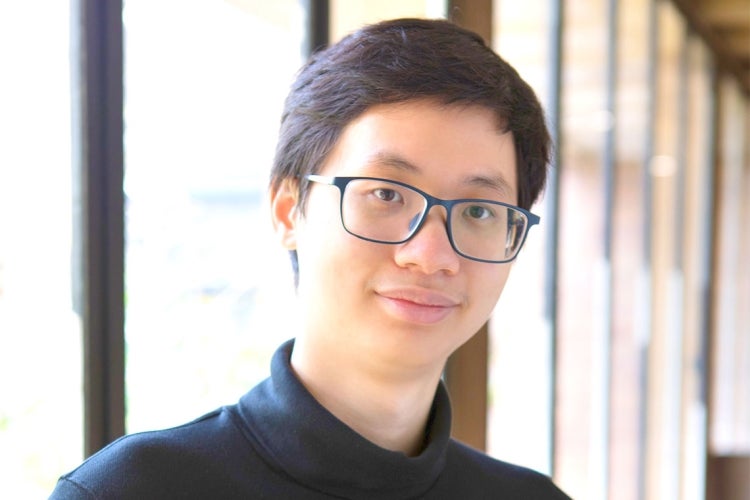
Prompiengchai, who grew up in Thailand and attended school in India, is one of two Rhodes Global Scholars this year – making him the first recipient selected from Thailand through the Global Rhodes program, which is open to candidates from parts of the world that aren’t covered by one of the 25 Rhodes constituencies.
He says the news took a toll on his vocal cords.
“I probably lost my voice from talking to so many incredible people at the University of Oxford and then calling everyone I know,” says Prompiengchai, a fourth-year neuroscience student at U of T Scarborough.
A 2020 recipient of U of T’s Lester B. Pearson International Scholarship, Prompiengchai earned recognition for his interdisciplinary mental health research and advocacy. That includes receiving undergraduate research prizes for several of his papers.
A member of the student advisory committee for Inlight, one of U of T’s institutional strategic initiatives, Prompiengchai has worked in five research labs specializing in disciplines including clinical neuroscience, memory and educational psychology.
He is currently working in Professor Andy Lee’s cognitive neuroscience lab at U of T Scarborough where he is doing functional magnetic resonance imaging (fMRI) experiments to discover how the brain encodes time when memories are formed.
“I think to properly tackle mental health you need to become a multidisciplinary scientist, so I hope to learn more about genetics and chemistry,” he says.
“I hope to one day be a scientist who can work with diverse stakeholders – including politicians, clinicians, scientists and community groups from diverse backgrounds – in order to translate research into real-world solutions.”
Tierrai Tull
Faculty of Arts & Science
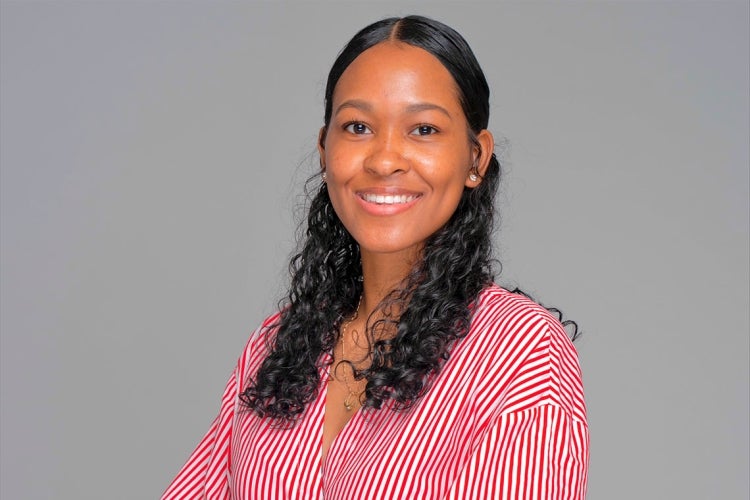
Tull, a fourth-year student in Woodsworth College studying political science in the Faculty of Arts & Science, says she was on her evening walk overlooking the waters of Bermuda when she got the call.
“I screamed, and I had to mute myself because I didn’t want to blow [the national secretary’s] eardrums out,” says Tull, an international student who is representing the Rhodes constituency of Bermuda. “I was just so overcome with joy that I ran for 15 minutes straight home.”
A recipient of the Dean’s Excellence Award and the Frank Peers Award for International Study, Tull says her studies have focused on gender in the Caribbean, pursuing research ranging from appropriation in the health and wellness industry to the case for reparations under John Locke’s theory of labour.
Her time at U of T has been a “global experience” spanning five countries, Tull says.
Starting her studies in fall 2020 amid the COVID-19 pandemic, Tull took courses virtually in Armenia during the Nagorno-Karabakh conflict. She continued her remote studies from Bermuda and the U.S. before arriving at U of T in her second year. After studying abroad at University College London, she returned to the St. George campus to finish her degree.
Tull says she’s looking forward to continuing her studies at Oxford, where she’s interested in exploring the social sciences and women’s studies.
A first-generation student on full scholarship, Tull says she hopes her success will inspire students in similar circumstances to shoot for prestigious programs like Rhodes.
“I would encourage anyone who is struggling but has big goals to dare to dream and dare to achieve,” she says. “Don’t tell yourself no before anyone else does.”
Leighton Schreyer
Temerty Faculty of Medicine
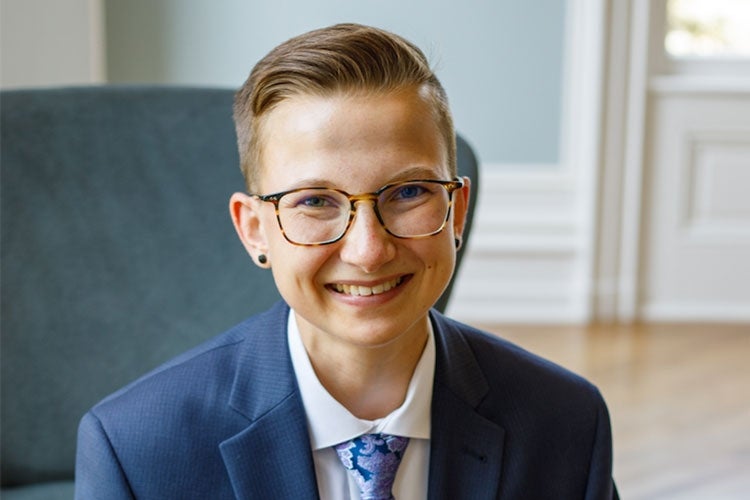
Schreyer, one of two U of T students among the 11 Rhodes Scholars selected from Canada, says receiving the call from Rhodes organizers quickly turned into an impromptu celebration.
“I had to turn the stove burner off, so I wasn’t going to burn down my building,” they say. “I think I did a bit of a party dance.”
An activist, writer and poet, Schreyer says their emphasis on the human side of medicine was informed by interactions with the health system – a theme explored in works that have been published in leading medical journals, literary magazines and news outlets. They have also held research positions at Sunnybrook Health Sciences Centre, Unity Health Toronto and the Hospital for Sick Children.
Schreyer plans on fusing passions for storytelling and medicine by pursuing a DPhil in anthropology at Oxford, specializing in medical anthropology. Their interests lie in the field of narrative medicine, which honours the fundamental role that story plays in health care and caregiving – and explores how narrative can help bridge the gap between the biological manifestation of disease and the patient’s lived experience of illness. They credit U of T’s health, arts and humanities program with formally introducing them to the field.
“My story – the narrative of my life – is far from complete and, in many ways, I hope it never will be; I want to be continuously challenged to rethink, rework and refine my story,” Schreyer says. “I hope that, through Rhodes, I will have the opportunity to gain perspective and participate in experiences that will allow me to walk away from Oxford with a bigger, more complete and comprehensive story of the world.”
Adam Martínez
Faculty of Applied Science & Engineering
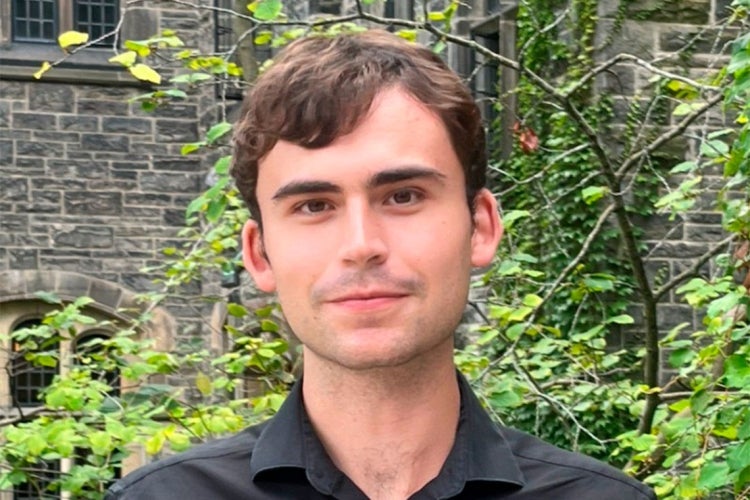
Martínez, who was also named a Rhodes Scholar from Canada, says receiving the scholarship was a life-altering event.
“I was walking across campus when I got the call,” he says. “All I really heard were the words ‘Welcome to the Rhodes community,’ and after that it was kind of hard to focus. I could really sense a shift in the trajectory of my future.”
A recipient of U of T’s National Scholarship, Martínez is majoring in engineering physics and has taken on internships and fellowships at leading-edge labs in Ontario and around the world. A key theme of his research is the potential of new materials to solve complex challenges in different domains, from biomedicine to sustainability.
“One example I think about a lot is catalytic materials that can convert captured carbon dioxide into products that we already need, such as methanol and ethanol,” he says. “This could help us close the carbon loop and develop a low-carbon economy.”
However, synthesizing and testing the millions of potential catalytic materials in a lab is too slow, Martinez says, with emerging technologies such as AI and quantum computing holding the potential to dramatically speed up the process.
As a thesis student at the Vector Institute, he is using generative AI models to simulate quantum circuits and bring such systems closer to reality.
He plans to pursue similar research at Oxford, saying the scholarship will help him make new connections and find new problems to solve.
“The Rhodes community includes a lot of different people coming from different areas of the world and different disciplines,” he says. “It’s an opportunity to open dialogues, to think about the implications of my field on theirs, and to use that space to try to do good in the world.”
Prompiengchai, Schreyer, Martínez and Tull were all supported by U of T’s internal selection process for the scholarship.


